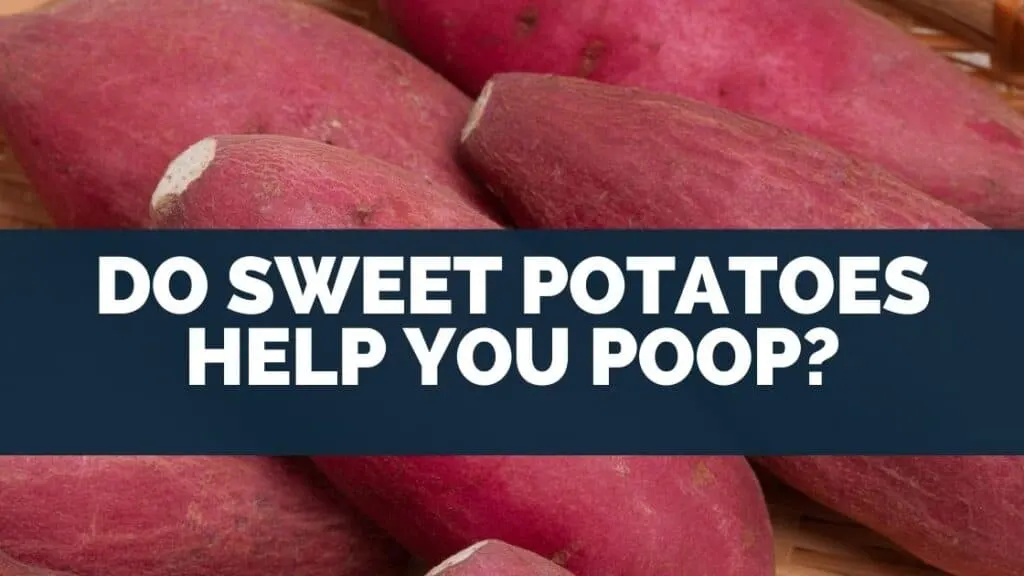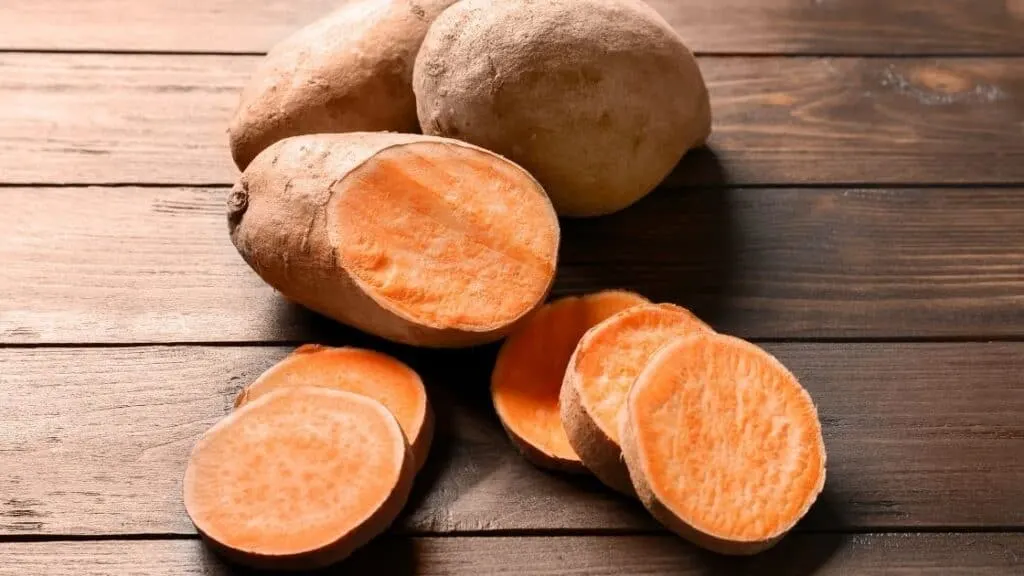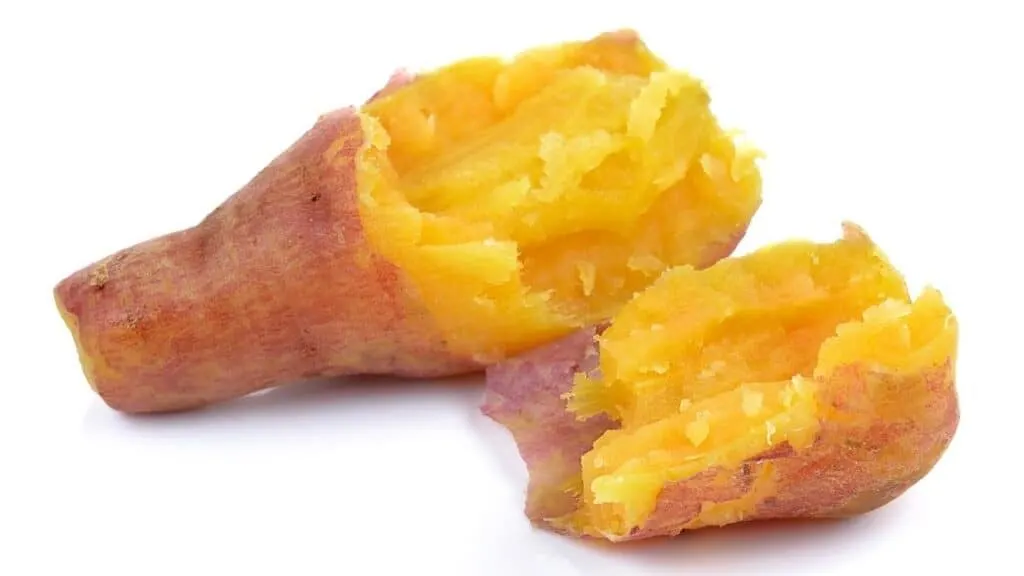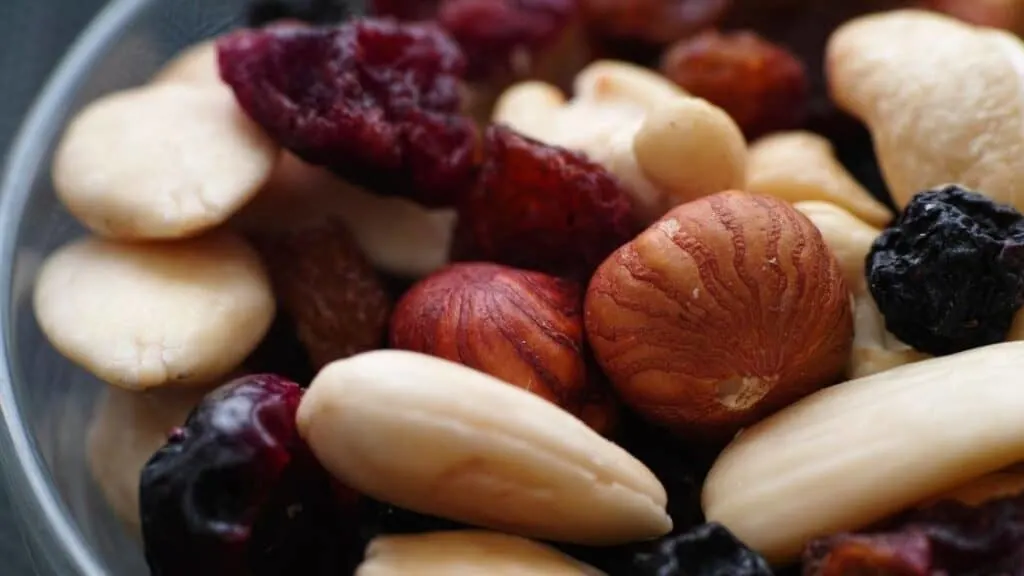
Chock full of nutrition and vitamins, the sweet potato is a versatile, healthy root vegetable that can be cooked in a multitude of ways.
The more nutritional methods are steaming and boiling while frying and baking will add to its fat content and calories.
In addition to providing loads of carbohydrates, vitamins, and minerals, the high fiber content in sweet potatoes will ensure a healthy digestive system, promote efficient bowel movements and help you poop.
Each sweet potato contains about 4 grams of fiber, a substantial percentage of the recommended daily intake of 25 to 30 grams.
The current daily intake of the average American is about 15 grams, about half of the recommended amount.
In addition, sweet potatoes are jam-packed with nutrition.
A boiled medium potato has the following nutritional value:
| Name | Amount | Unit |
| Calories | 114 | |
| Protein | 2.04 | g |
| Carbohydrates | 26.5 | g |
| Fiber | 3.7 | g |
| Sugars | 8.58 | g |
| Calcium | 40.5 | mg |
| Potassium | 344 | mg |
| Phosphorus | 48 | mg |
| Sodium | 272 | mg |
| Vitamin C | 19 | mg |
| Beta Carotene | 14100 | µg |
Fiber is essential for helping foods move through your digestive system, into your colon, and out as waste.
Too little fiber can lead to constipation and other health complications.
There are several types of fiber; soluble, insoluble, fermentable, and unfermentable.
Soluble fiber dissolves in water to form a gel-like substance.
It can help promote bowel movements, lower blood pressure, blood cholesterol, and glucose levels.
Insoluble fiber collects water into the stool, making it softer and easier to pass with less strain on your bowel.
It can help promote regularity and prevent constipation.
Unfermentable fiber functions similarly to insoluble fiber, giving the stool its bulk.
Fermentable fibers like pectins, beta-glucans, inulin, oligofructose, and guar gum are the unsung heroes of your body.
An estimated 100 trillion different types of healthy bacteria live in your large intestine, also called your gut.
These bacteria are called probiotics and are so beneficial to the body that they are often referred to as the “ forgotten organ”.
Probiotics can be found in foods like sauerkraut, yogurt, kombucha, miso, and supplements.
The primary function of gut bacteria is to maintain balance in the body. When harmful invading bacteria enter, it throws your immune system out of whack.
The probiotics’ job is to help fight off the bad and boost the immune system to deal with the infection.
They also help digest food, create nutrients, and line the cells in the colon to prevent any harmful bacteria from getting through.
While these trillions of good guys are typically found in the colon and intestines, they can also be found in other parts of your body.
Sweet potatoes contain loads of pectin and other fermentable fibers.
These fibers that your probiotics can munch on are called prebiotic.
They move primarily undisturbed through your digestive tract and find themselves in your gut, where your probiotic good guys are hungrily waiting.
Keeping your gut bacteria happy, fed, and healthy will keep them fighting hard for your immune system and maintain a healthy and balanced body.
Does Sweet Potato Make Your Poop Orange?
Foods high in the powerful antioxidant beta carotene, can make your poop have an orange tint.
Beta carotene is commonly found in red or orange vegetables like carrots, pumpkin, squash, and sweet potatoes.
Beta carotene is an orange-red pigment found in some fruits and vegetables.
The name comes from the Greek “beta”, and the Latin “carota”.
When we ingest beta carotene, our bodies convert it into vitamin A, an essential nutrient needed for healthy skin, mucus membranes, the immune system, and eye health.
The health benefits of both beta carotene and vitamin A are numerous.
Benefits of beta carotene
- Beta Carotene Is A Powerful Antioxidant
Beta carotene, like all other carotenoids, is a potent antioxidant.
These substances bind to free radicals, stabilizing the body and protecting the body from damage.
Free radicals are unstable molecules that are almost impossible to avoid.
We absorb them through radiation exposure, cigarette smoke, ozone, industrial chemicals, and other air pollutants.
When functioning as they should, free radicals help the body in many beneficial ways, including combating pathogens.
However, when the levels of free radicals exceed the levels of antioxidants, it results in a condition called oxidative stress.
Prolonged periods of oxidative stress can lead to severe chronic illnesses like:
- Neurodegenerative diseases like Parkinson’s or Alzheimer’s
- Heart disease
- High blood pressure
- Inflammatory conditions
- Diabetes
- High blood pressure and hypertension
- Cancer
High levels of antioxidants can help boost the immune system, protect against free radical damage to the cells, and lower the risk of heart disease and cancer.
Some studies have shown that those consuming four servings of beta carotene-rich fruits or vegetables have a lower risk of developing severe illnesses.
- Beta Carotene Also Slow Cognitive Decline
A study in 2007 showed that men taking beta carotene supplements for 15 years or more are less inclined to experience cognitive decline. (Source)
The study involved more than 4,000 men, comparing them to another focus group given a placebo.
In the long term, it was clear that beta carotene made a significant difference.
- Preventing Cellular Damage
As we age, our cells are constantly damaged by oxygenated free radicals.
Studies have shown that a high antioxidant diet can help slow cell damage by aging and prolong the health of internal organs.
Are Sweet Potatoes Good For Constipation?
Yes! Sweet potatoes are a fantastic source of dietary fiber and will promote healthy bowel movements, keep you regular, and prevent constipation.
One medium sweet potato contains 4 grams of fiber, a decent amount of 25 to 30 grams of the daily recommended amount.
Consider eating the sweet potato with the skin on; about half of the fiber contained in a sweet potato is found in the skin.
More people than ever are suffering from constipation than a few decades ago due to a sedentary lifestyle and unhealthy diet lacking in fiber.
Constipation means your stools have become hard and dry, and you go several days without bowel movements.
There are a few factors that can cause constipation, like:
- Dehydration
- Lack of fiber
- Lack of exercise
- Lifestyle changes like traveling or jet lag
- Eating excessive dairy
- Stress
- Resisting the urge to poop
Are Sweet Potatoes A Natural Laxative?
Sweet potatoes are a laxative superfood that contains loads of nutrients like water, fiber, vitamin B6 and magnesium.
They are an excellent addition to the diet to help prevent constipation, regulate bowel movements, and maintain healthy gut health.
Constipation is a common condition caused by several factors such as dehydration, lack of fiber, stress, and lifestyle changes.
One medium-sized sweet potato contains 4 grams of fiber, while a large potato contains 7.5 grams.
In contrast, the recommended daily fiber intake is 25 to 30 grams.
However, the average American consumes about 15 grams of dietary fiber daily, about half of the recommended amount.
Constipation can be helped by:
- Drinking more water during the day
- Avoid caffeine drinks and alcohol, which can cause dehydration
- Add more fruits, vegetables, whole grains, and other fiber-rich foods to the diet
- Reduce the consumption of high-fat foods like meat, eggs, and cheese
- Introduce a modest exercise routine to your day
What Foods Will Make You Poop Right Away?
In addition to sweet potatoes, other foods like nuts, berries, seeds, legumes, vegetables, fruits, and whole grains are incredibly fiber-rich.
They will have you running to the toilet for a healthy, comfortable bowel movement.
Constipation is on the rise, affecting us more than ever because of dietary changes and sedentary lifestyles.
While the recommended daily intake of fiber is 25 to 30 grams, the average American consumes a mere 15 grams of fiber a day.
Although caused by many factors, most cases of constipation is caused by:
- Dehydration
- Lack of fiber
- High fat or processed food content in the diet
- Lack of exercise
Fiber is necessary to move food through the digestive tract and into the colon.
There, it feeds the healthy gut bacteria in the colon called probiotics.
Probiotics are what keeps your gut balanced, boost the immune system, and prevent cellular damage from harmful invading bacteria.
The fiber that the probiotics can ferment is called prebiotics.
Sweet potatoes are a prebiotic and will contribute to a happy, healthy gut.
The insoluble fiber attracts water to the stool, giving it the bulk and making it easier to pass.
In addition, fiber is known to:
- Reduce cholesterol
- Maintain healthy blood sugar levels
- Help with weight control by making you feel fuller for longer
- Reduce gastrointestinal cancer risk
- Help prevent gastrointestinal upsets
- Maintain healthy blood pressure and reduce the risk of hypertension and heart disease
Foods high in fiber are:
- Pears
- Strawberries
- Avocados
- Apples
- Raspberries
- Bananas
- Carrots
- Beets
- Broccoli
- Artichoke
- Brussel sprouts
- Kale
- Spinach
- Tomatoes
- Lentils
- Beans
- Peas
- Seeds
- Quinoa
- Oats
- Bran
- Nuts
- Sweet potatoes
As you can see, fiber is found everywhere and most commonly in nuts, seeds, whole grains, vegetables, and fruits.
By making specific dietary and lifestyle changes, constipation can easily be avoided. We wish you the best of health!

I’m Chris Watson & the Founder of EatForLonger.com. I’m a food and wellbeing enthusiast researching and sharing foodstuffs and simple food-based concepts, such as fasting and clean eating.
I hope it inspires you to make tiny changes to what you eat and when you eat while optimizing your healthspan and all-around well-being.
Read more About Me here.




